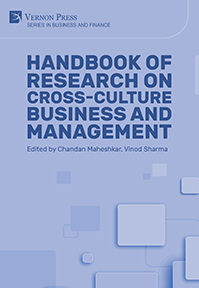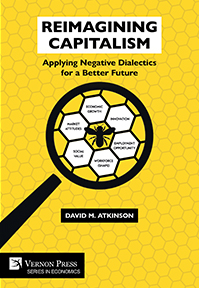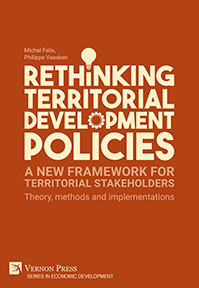Search
Browse
by Publication status
by Subject
Anthropology (26) Art (124) Business and Finance (26) Cognitive Science and Psychology (54) Communication and Journalism (45) Economics (62) Education (66) History (149) Human Geography (22) Interdisciplinary (42) Language and Linguistics (129) Law (16) Music Studies (18) Philosophy (157) Political Science and International Relations (103) Sociology (304) Statistics and Quantitative Methods (20)by Series
Series in Literary Studies (65) Series in Philosophy (59) Series in Education (51) Series in Sociology (42) Series in Politics (32) Series in World History (32) Bridging Languages and Scholarship (31) Series in Language and Linguistics (25) Cognitive Science and Psychology (20) Series in American History (20) Series in Philosophy of Religion (20) Series in Art (19) Critical Perspectives on Social Science (16) Series in Cinema and Culture (16) Curating and Interpreting Culture (15) Series in Critical Media Studies (14) Series on the History of Art (14) Series in Anthropology (13) Series in Business and Finance (13) Economics (13) Series in Music (12) Series in Communication (9) Series in Performing Arts (9) Philosophy of Personalism (8) Series in Law (8) Series in Economic Methodology (7) Series on Climate Change and Society (7) Women's Studies (7) Classics in Economics (6) Series in Economic Development (6) Philosophy of Forgiveness (5) Series in Built Environment (5) Series in Economic History (5) Series in Philosophy of Science (4) Series in Social Equality and Justice (4) Series on the History of Science (4) Serie En Estudios Literarios (3) Serie en Sociología (3) Series in Contemporary History (3) Series in Creative Writing Studies (3) Series in Design (3) The Interdisciplinary Built Environment (3) Serie en Comunicación y Medios (2) Serie en Historia (2) Series in Heritage Studies (2) Series in Innovation Studies (2) Series in Philosophy of Race (2) Serie en Ciencias Políticas (1) Serie en Entorno Construido (1) Serie en Estudios Culturales (1) Serie en Filosofía (1) Serie en Filosofía de la Ciencia (1) Serie en Música (1) Series in Classical Studies (1) Series in Economics of Technological Change (1) Series in Urban Studies (1)by Language
English Spanishby Author
Browsing with filters

Handbook of Research on Cross-culture Business and Management
Edited by
Chandan Maheshkar, East Nimar Society for Education (ENSE), Indore, India
and Vinod Sharma, SCMHRD, Symbiosis International University Pune, India
Availability: In stock
359pp. ¦ $80 £66 €75
As organizations and businesses continue to expand in the cross-border and multicultural markets, culture needs to be taken into consideration. At present, culture introduces significant changes in the core assumptions of business practices and skill expectations. Gaining cross-cultural compatibility is now a serious concern for businesses and organizations. Appreciating the overall view of cross-cultural business environment, 'Handbook of Research on Cross-culture Business and Management' is a significant attempt to contribute a piece of knowledge on different aspects of cross-cultural business and management, facilitating practitioners and academicians to explore different cross-cultural business practices and develop competencies. This book will be a unique source for cross-cultural business and management practices, helping people of both industry and academia to understand the cross-cultural business environment and improve management practices.
Reimagining Capitalism: Applying Negative Dialectics for a Better Future
David M. Atkinson, York St John University
Availability: In stock
455pp. ¦ $82 £65 €77
The Covid-19 pandemic reinforced the perception that capitalism is in crisis, that the future is volatile, uncertain, complex and ambiguous, and that, increasingly, our thinking about it and ability to manage and organize ourselves within it, are challenges we are ill-equipped for. Despite the efforts of many writers, and a surfeit of manuscripts concerning the need to rethink capitalism, questions concerning the struggle for social and economic justice remain unanswered. While some suggest that with corrective action, businesses can save the world, there is an acceptance that they cannot do so alone. However, while governments might strengthen their institutions, enacting more effective policies, the challenge is simply laid bare at the feet of industry and commerce. Is the challenge to confront the establishment just too big to face? Government institutions and the barons of industry and commerce are but interrelated, interconnected, interplaying components in one socio-economic system. This book offers readers a progressive, radical and academic provocation of that system; it also proposes a field of Applied Negative Dialectics. In 'Reimagining Capitalism', Atkinson confronts the need to rethink capitalism and presents an integrated range of thinking through a lens of applied negative dialectics, questioning how and why things might have occurred, and where and how we might begin to improve them.
Florentine Ariosto Jones: A Yankee in Switzerland and the Early Globalization of the American System of Watchmaking
Frank Jacob, Nord University, Norway
Availability: In stock
129pp. [Color] ¦ $75 £55 €62
This book recounts the story of Florentine Ariosto Jones, who after the Civil War decided to manufacture watches. Combining the cheap labor available at the time in Switzerland with US manufacturing technologies, Jones embarked on his venture to produce affordable watches for the American market. Consequently, he became a pioneer in the business of outsourcing labor for economic purposes through his contracting of labor to Europe. While the company still exists today, very little is known about Jones. The present book will undoubtedly change this by telling the fascinating story of an American adventurer and his pursuit to globalize American watchmaking at the end of the 19th Century.
Florentine Ariosto Jones: A Yankee in Switzerland and the Early Globalization of the American System of Watchmaking
Frank Jacob, Nord University, Norway
Availability: In stock
129pp. ¦ $46 £33 €38
This book recounts the story of Florentine Ariosto Jones, who after the Civil War decided to manufacture watches. Combining the cheap labor available at the time in Switzerland with US manufacturing technologies, Jones embarked on his venture to produce affordable watches for the American market. Consequently, he became a pioneer in the business of outsourcing labor for economic purposes through his contracting of labor to Europe. While the company still exists today, very little is known about Jones. The present book will undoubtedly change this by telling the fascinating story of an American adventurer and his pursuit to globalize American watchmaking at the end of the 19th Century.
Rethinking Territorial Development Policies: A new framework for territorial stakeholders
Theory, methods and implementations
Michel Felix, Skema Business School
and Philippe Vaesken, Lille University, France
Availability: In stock
180pp. ¦ $45 £33 €38
This book provides an analytical framework and toolkit for anyone involved — theoretically or practically — with the economic, social, ecological or cultural development of a territory. This work provides an overview of the various territorial development processes, inclusive of both individual and collective actions. In pursuance of its objectives, the book re-examines the classical concepts of governance and regulation in order to position them in an integrative model of the initiatives which contribute dynamically to territorial development. According to this model, the concepts of governance and regulation become two axes, revealing four main reference situations which differentiate between the local initiatives (ground-up) and public actions (top-down) that coexist in a territory. The model emphasizes the need to consider the place of territorial stakeholders in regulatory processes. The book enriches this concept, familiar in a legislative context, and describes it as an area of influence of and negotiation with stakeholders. It contributes to a territorial governance system which encourages development offers. It reveals the inseparable link between influence and development processes that lead to value creation. The logic of governance specifies the various sources of value creation, while the logic of regulation seeks to maximize the acceptability of such value creation by making it into an attractive proposition for stakeholders.






